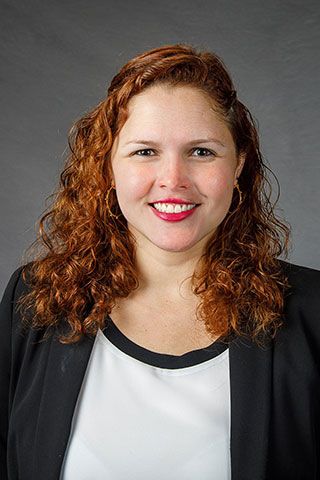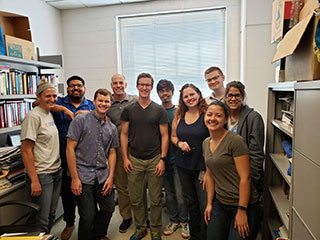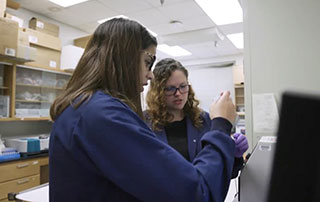April 7, 2021

Gutierrez recently received her doctoral degree in chemical and materials engineering from the University of Kentucky under the mentorship of UK SRP project leads J. Zach Hilt, Ph.D., and Thomas Dziubla, Ph.D.
(Photo courtesy of Angela Gutierrez)
Angela Gutierrez, Ph.D., explores low-cost sustainable strategies to clean up water contaminated with organic contaminants, such as polychlorinated biphenyls (PCBs) and per- and polyfluoroalkyl substances (PFAS). She is a postdoctoral researcher at the University of Kentucky Superfund Research Program (UK SRP) Center and also is a co-lead on a new NIEHS small business innovative research grant with Bluegrass Advanced Materials, LLC.
Gutierrez developed an interest in clean water while pursuing her bachelor’s in chemical engineering, for which she studied how organic chemicals from printer ink cartridges contaminate drinking water sources.
“Coming from Colombia, I have always had an interest in finding ways to make clean water more accessible to people,” said Gutierrez. “To me, it is clear that something as simple as access to clean drinking water can change people’s lives.”
She hopes to bring new, affordable technologies to the places where it is most needed, like her home country.
Using Magnetic Particles to Capture Pollutants
Gutierrez and the UK SRP Center research team are working to develop magnetic nanoparticles to capture and remove dangerous contaminants, like PCBs, from water. Leveraging naturally occurring antioxidants, such as polyphenols found in berries and turmeric with magnetic properties, the researchers have increased the nanoparticles’ capacity to bind organic contaminants.

Gutierrez and other UK SRP Center trainees are working under the mentorship of Dibakar Bhattacharyya, Ph.D., and J. Zach Hilt, Ph.D., to develop sustainable technologies to reduce exposure to organic contaminants.
(Photo courtesy of Angela Gutierrez)
“We are developing a material that is cost-effective, fast, and more sustainable than current technologies,” said Gutierrez. “The magnetic nature of this technology allows us to recapture the nanoparticles after treatment so they can be reused.”
Gutierrez and team are improving the technology’s performance and exploring ways to modify it to bind to other contaminants.
Gutierrez received the 2017 SRP Karen Wetterhahn Memorial Award for her innovative work with magnetic nanoparticles and her involvement in scientific communication and outreach.
“Receiving the Wetterhahn Award was an incredible honor, and I am still so excited about being able to join this prestigious community of scientists,” she noted. “This recognition opened doors for me to develop connections with other researchers and has expanded my research, as well as provided great mentoring opportunities.”
Leveraging Scientific Collaborations for Translational Research
Gutierrez noted that working in a collaborative environment with other experts and stakeholders is extremely important.
“Team science allows you to start thinking not just about your interest as a researcher, but about the needs of affected community members and stakeholders to develop innovative solutions that address their problems,” said Gutierrez.
In 2016, Gutierrez received an SRP K.C. Donnelly Externship award to work with researchers at the U.S. Environmental Protection Agency (EPA) Office of Research and Development's Engineering Technical Support Center. During her time at the EPA, Gutierrez learned how remediation technologies are tested and validated to successfully transfer laboratory work to field-scale studies.
“I brought that valuable knowledge back with me to the UK SRP Center,” she noted. “We were just starting to develop a new instrument, which is now the standard used by graduate students in our labs.”
Commercializing Technology to Remove PFAS From the Environment
Gutierrez co-leads a recently-funded NIEHS SRP-funded small business, Bluegrass Advanced Materials, a spin-off of her UK SRP Center research project. The team includes UK SRP Center researchers J. Zach Hilt, Ph.D., and Tom Dziubla, Ph.D. The company is developing a technology to remove persistent contaminants, such as PFAS, from drinking and wastewater.
Their technology relies on temperature changes to bind the contaminants together and quickly separate solids and liquids. This process is referred to as flocculation where larger aggregations of particles, or flocs, can be more easily removed from water.
Bluegrass Advanced Materials is currently testing different floc materials and their behavior under various conditions. The goal is to develop a commercial product that can be used to clean up contaminated water.
Training the Next Generation of Scientific Leaders

A passionate mentor, Gutierrez works closely with undergraduate students at the University of Kentucky who are interested in doing research.
(Photo courtesy of Angela Gutierrez)
Gutierrez is passionate about inspiring kids to pursue a career in science. For example, she is involved with the UK SRP Expanding Your Horizons Conference. The all-day an annual conference inspires young girls from across Kentucky to pursue science, technology, engineering, mathematics (STEM) careers.
“I love talking to kids and future scientists so they can get excited about science,” she said. “I enjoy teaching them how a career in STEM can open doors in so many different areas, not just in a lab.”
As the liaison for the UK SRP Center Research Experience & Training Coordination Core, Gutierrez is involved in planning diverse career and research translation development activities for graduate students, such as courses and conferences. She also hosts monthly meetings with UK SRP Center trainees to hear about their experiences and needs and is exploring ways to enhance collaboration opportunities across UK SRP Center projects to speed up the pace of their research.
“Working with trainees and seeing them get excited about research as they become independent investigators is extremely fulfilling,” she noted. “I still love doing my own research but being able to connect with trainees and principal investigators allows us to look at the bigger picture to make a greater impact.”


